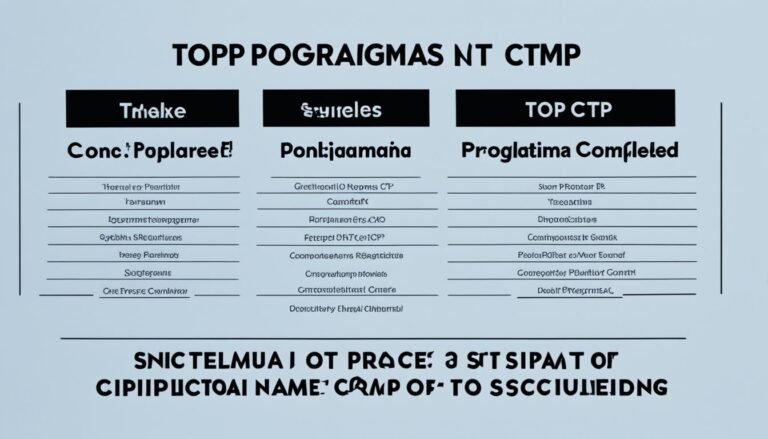Review of Financial Modeling and Valuation Analyst (FMVA) Certification
Did you know the FMVA Certification from CFI is loved by more than 500,000 learners?
This program is made for anyone looking to boost their financial analysis skills. It teaches you how to build powerful financial models. The topics include modeling, budgeting, forecasting, and finance skills. The program includes 52 courses, more than 2710 lessons, and over 200 interactive exercises. This gives learners a full education on the subject.
Key Takeaways:
- The FMVA Certification is highly rated by over 500,000 learners
- The program covers a wide range of financial analysis and modeling topics
- It consists of 52 courses with over 2710 lessons and 200+ interactive exercises
FMVA Program Curriculum
The Financial Modeling and Valuation Analyst (FMVA) program provides a detailed curriculum. It aims to give learners skills in financial analysis and modeling. The program includes required core courses, elective courses, case study challenges, and a final exam.
Required Core Courses
The FMVA program has 14 core courses. These cover vital topics in financial analysis and modeling. Course titles include Financial Analysis Fundamentals, Business Valuation, and more.
Students will master financial modeling techniques, valuation methods, and budgeting. Each course builds a strong base in these finance areas.
Elective Courses
Students can pick at least 3 elective courses from 27 options. These courses let learners focus on their specific interests and career goals. Options include Advanced Excel for Financial Modeling and Real Estate Financial Modeling.
Case Study Challenges
There are also optional case study challenges. They help students put their skills to the test with real projects. These are great for enhancing problem-solving skills and decision-making. They also improve how students share their findings.
Final Exam
A final exam is required to get the FMVA certification. It tests students on the main program concepts. They must score at least 70% to pass and earn their certification.
| Program Component | Description |
|---|---|
| Required Core Courses | 14 courses covering financial analysis, modeling, valuation, accounting, and more. |
| Elective Courses | Choose a minimum of 3 courses from 27 options to specialize in advanced topics. |
| Case Study Challenges | Optional challenges to apply knowledge and skills to real-world financial modeling problems. |
| Final Exam | A comprehensive exam to test understanding and application of program concepts. |
Skills and Learning Objectives
The Financial Modeling and Valuation Analyst (FMVA) program helps learners gain valuable skills in financial analysis and modeling. With structured lessons and hands-on practice, this program boosts proficiency in various financial areas.
Accounting Skills
The FMVA program dives into vital accounting skills. It ensures learners understand financial statements and key accounting principles. This knowledge is key for creating accurate financial models.
Excel Skills
Excel is a must for financial jobs. The FMVA program teaches learners how to effectively use Excel for analysis and modeling. This skill is a big advantage in the finance world.
Finance Skills
Knowing finance is crucial for anyone in financial modeling and analytics. The FMVA program explains essential finance concepts, like the time value of money. It also teaches capital budgeting and risk analysis.
Financial Modeling Skills
Building financial models is a top skill for analysts. The FMVA program shows how to create solid and reliable models for different situations. This is invaluable in the financial sector.
Valuation Skills
Valuing companies and assets is a key part of financial analysis. The FMVA program equips learners to value businesses and assets accurately. They learn various valuation methods.
Budgeting and Forecasting Skills
Creating budgets and forecasts is crucial for planning and decision-making. The FMVA program teaches learners how to make detailed and insightful financial plans. These skills are vital in finance.
Presentation and Visual Skills
Communication is key in financial analysis. The FMVA program teaches how to present models and analysis effectively. This ensures stakeholders understand your work.
Strategy Skills
Thinking strategically sets you apart in finance. The FMVA program guides learners on analyzing business strategies. It also helps make smart financial recommendations based on them.
The FMVA program combines theory with real-world practice. It prepares learners well for their financial careers. With a wide curriculum, it meets the needs of many finance professionals.
| FMVA Skills | FMVA Learning Objectives |
|---|---|
| Accounting Skills | Understanding financial statements and accounting principles |
| Excel Skills | Proficiency in Microsoft Excel for financial analysis and modeling |
| Finance Skills | Understanding finance concepts for financial analysis |
| Financial Modeling Skills | Building accurate and robust financial models |
| Valuation Skills | Effectively valuing businesses and assets |
| Budgeting and Forecasting Skills | Developing accurate and insightful financial budgets and forecasts |
| Presentation and Visual Skills | Communicating financial models and analysis effectively |
| Strategy Skills | Analyzing business strategies and making strategic recommendations |
Meet Your Instructors
The FMVA program’s team has deep expertise in finance, investment banking, and more. They offer a lot of knowledge to help students learn well.
Tim Vipond
Tim Vipond leads CFI Education’s Board. He’s got over 20 years in investment banking, focusing on mergers, financial modeling, and more. Tim is especially skilled in analyzing finances and business strategy.
Scott Powell
Scott Powell co-founded CFI and is its Chief Content Officer. He has strong skills in investment banking and private equity, including financial analysis and complex financial transactions. He’s known for creating financial models and frameworks for valuation.
Duncan McKeen
Duncan McKeen is CFI’s Executive Vice President for Financial Modeling. He’s good at financial analysis, forecasting, and planning, specializing in financial models for decision-making.
Jeff Schmidt
Jeff Schmidt, CFI’s Vice President for Financial Modeling, is an industry expert. He focuses on analyzing and valuing companies in tech, healthcare, and real estate. His knowledge helps students develop financial models for these sectors.
Our instructors offer practical knowledge, tech skills, and industry insights in the FMVA program. From their varied experiences, learners gain unique knowledge and expertise.
Careers in Financial Modeling and Valuation
The FMVA certification opens many doors for those keen on financial modeling and valuation. It leads to various job opportunities. These include roles in equity research, corporate development, private equity, FP&A, and investment banking.
FMVA professionals handle tasks like financial analysis, making investment suggestions, and valuing businesses. They also create budgets and forecasts besides raising capital. They are key in analyzing financial data, spotting investment chances, and advising companies.
By gaining the FMVA certification, you can establish a successful career in finance. This program provides the skills you need to succeed in financial modeling. It prepares you well to face the challenges of valuation and make sound financial choices.
| Job Roles | Career Path | Salary Potential |
|---|---|---|
| Equity Research Analyst | – Bachelor’s Degree in Finance, CFA certification (optional) – FMVA certification – Relevant work experience (internships, research projects) – Continual learning and updating skills |
$80,000 – $120,000 per year (depending on experience and company size) |
| Corporate Development Associate | – Bachelor’s Degree in Finance, Accounting, or Economics – FMVA certification – Experience in financial analysis, M&A, or business development – Strong communication and presentation skills |
$90,000 – $130,000 per year (depending on experience and company size) |
| Private Equity Analyst | – Bachelor’s Degree in Finance, Economics, or Business – FMVA certification – Experience in investment analysis or financial modeling – Strong analytical and due diligence skills |
$100,000 – $150,000 per year (depending on experience and company size) |
| FP&A Manager | – Bachelor’s Degree in Finance, Accounting, or Business Administration – FMVA certification – Experience in financial planning, budgeting, and forecasting – Advanced Excel skills and knowledge of financial systems |
$100,000 – $140,000 per year (depending on experience and company size) |
| Investment Banking Analyst | – Bachelor’s Degree in Finance, Economics, or related field – FMVA certification – Internship experience in investment banking – Strong quantitative and analytical skills |
$100,000 – $150,000 per year (depending on experience and company size) |
According to CFI, FMVA graduates could make about $121,000 annually on average. Yet, real pay may differ based on where you work, your experience, and the size of the business. The FMVA certification not only boosts chances for advancement but also gives professionals the skills and confidence for success in the financial modeling and valuation sector.
Student Reviews and Testimonials
The FMVA program has been well-received by its students. They’ve praised it for the thorough and clear training in financial analysis and modeling. The course material, instructors, and case studies stand out to them. They also like that they could study online and at their own pace. These factors make the FMVA certification a great addition to their resumes.
“The FMVA program offered by CFI exceeded my expectations. The courses covered a lot about financial analysis. The hands-on exercises and case studies made everything practical. The instructors always helped out.” – John Smith
Emily Johnson also had good things to say about the FMVA program. She believes it’s a must for anyone wanting to improve their financial modeling skills. The program’s depth and the fact that you can study online while keeping a job were big pluses for her. Since earning her certification, she’s seen more job offers and feels stronger in financial analysis.
Michael Brown’s experience with the FMVA program was also life-changing. It equipped him with top skills for his financial analyst role. The interactive parts and real-world case studies really made the lessons stick. For him, the FMVA was key in moving forward professionally.
Key Takeaways from Student Reviews and Testimonials:
- Students value the detailed and clear training the FMVA program offers.
- The course material’s quality and the instructors’ expertise are highlights, too.
- Working on real cases during studies adds a lot to the learning.
- Students appreciate the chance to study at their own pace, thanks to the online set-up.
- Getting the FMVA certification helps with getting better jobs and advancing in financial analysis.
Overall, the program’s praise is well-deserved. It’s making a positive difference in professionals’ financial modeling and analysis skills. The practical learning, great teachers, and online convenience are a winning combination for many.
Comparison with Other Certifications
The FMVA certification is a top pick for finance pros. It’s known for its in-depth curriculum and industry respect. Here’s how it stacks up against other certifications.
FMVA vs CFA
The CFA is famous for its focus on investing. In contrast, the FMVA certificate covers a wider scope. It includes financial statement analysis, modeling, and more. This breadth makes it ideal for many finance jobs.
FMVA vs Other Finance Certifications
The FMVA stands out for its flexibility and hands-on challenges. It lets learners customize their studies and develops real-world skills. The self-paced online format fits well for busy finance professionals.
FMVA Cost Comparison
The FMVA certification’s price is lower than the CFA’s. Its comprehensive course is priced competitively. This makes it budget-friendly for those improving their finance modeling and valuation skills.
FMVA Recognition
While the FMVA is newer, it’s making a mark with over 100,000 enrollments yearly. Graduates find better job opportunities and career growth. This is because the industry values the program’s thorough approach.
| Certification | Curriculum | Focus | Cost | Recognition |
|---|---|---|---|---|
| FMVA | Comprehensive curriculum covering financial analysis and modeling | Broad range of finance roles | Affordable | Gaining industry recognition |
| CFA | Emphasis on investment and portfolio management | Specific to investment roles | Higher cost | Well-established and recognized |
| Other Finance Certifications | Varied depending on the certification | Varied depending on the certification | Varied depending on the certification | Varied depending on the certification |
Looking at the table, the FMVA has a solid curriculum, flexibility, and is budget-friendly. Ideal for roles needing strong financial analysis and modeling. It’s a great career booster for finance professionals.
FMVA Salaries and Compensation
The FMVA certification boosts the earning potential for finance pros. FMVA grads earn more on average than their counterparts. Salaries vary by place, experience, and job type.
CFI states FMVA grads make an average of $121,000 a year. This highlights how employers value the program’s complex skills in financial analysis and modeling.
This certification not only raises your salary. It also helps you move up in your career and find new finance job opportunities. With FMVA skills, you can shine in fields like equity research, corporate development, and more.
FMVA makes you stand out in a tough job market. It proves you are skilled in areas like financial analysis and budgeting. Employers see the value in these abilities and are ready to pay more for them.
FMVA Salary Comparison
| Job Role | Average Salary |
|---|---|
| Equity Research Analyst | $110,000 |
| Financial Analyst | $95,000 |
| Investment Banking Associate | $130,000 |
| FP&A Manager | $120,000 |
| Private Equity Associate | $150,000 |
FMVA grads earn more than others in similar jobs who don’t have the certification. The FMVA certification helps them succeed and earn better pay. It gives them a competitive advantage.
This certification doesn’t just up your salary. It proves your deep expertise in finance. FMVA grads show they’re dedicated to improving and learning more.
Conclusion
The FMVA certification is a complete course. It teaches financial analysis and modeling. This includes topics like accounting, Excel, finance, and more. The course is online and self-paced, perfect for those with a busy schedule who want to boost their finance career.
People who finish the FMVA program often do better in their careers. They find more job options, get paid more, and are more respected in their field. The course is detailed and uses real examples. This makes sure students learn the key skills needed to do well in finance.
To sum up, the FMVA course is a great way to gain important finance skills. It covers many useful topics. Thanks to its hands-on learning style, it helps students get ahead in finance. They find better jobs, earn more, and are valued more in the finance world.








